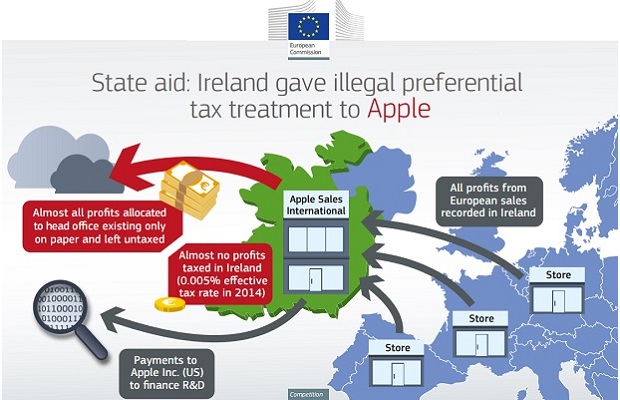Apple has been ordered to repay a record €13bn plus interest after the European Commission said Ireland illegally slashed the iPhone maker’s tax bill.
The move is the latest in a string of tax clampdowns by the European Union regulator. Amazon and McDonald’s also face probes over taxes by the European Commission, while coffee chain Starbucks has been ordered to pay up to €30m to the Dutch state.
The decision follows a three year investigation into Apple’s tax arrangements in the Republic of Ireland, which began in June 2014.
Apple benefited from a “selective tax treatment” in Ireland that gave it a “significant advantage over other businesses,” the European Commission said Tuesday in its largest tax penalty in its ongoing crackdown on sweetheart fiscal deals granted by EU nations.
The massive sum could be reduced, the EU executive said in a statement, if other countries sought more tax themselves from the US tech giant.
Commissioner Margrethe Vestager said that “Member States cannot give tax benefits to selected companies – this is illegal under EU state aid rules”. But the EC has determined that Ireland did exactly that, allowing Apple “to pay substantially less tax than other business over many years.”
Vestager said that Ireland should now recover the €13 billion in back taxes from Apple, plus interest, emphasizing that this is “not a penalty; it is unpaid taxes to be paid.”
In 2003, Apple Sales International – one of two Apple companies incorporated in Ireland – paid an effective corporate tax rate of 1% on its profits. Over the next decade, Vestager said, Apple’s tax payments in Ireland declined considerably; in 2014, it paid just €50 in taxes for every €1 million of profit, a rate of just 0.005%.
Apple said it will appeal the decision. The €13bn represents about 6% of Apple’s cash pile.
Apple says confident it will overturn EU tax ruling, says will have profound and harmful effect on investment pic.twitter.com/SWDEK6d0tP
— Rory Cellan-Jones (@ruskin147) 30 August 2016
“The European Commission has launched an effort to rewrite Apple’s history in Europe, ignore Ireland’s tax laws and upend the international tax system in the process. The Commission’s case is not about how much Apple pays in taxes, it’s about which government collects the money. It will have a profound and harmful effect on investment and job creation in Europe,” Apple said.
Ireland is unhappy with the EC’s findings too, and is also considering an appeal. In a statement to BBC News, Irish finance minister Michael Noonan said:
“I disagree profoundly with the Commission. The decision leaves me with no choice but to seek cabinet approval to appeal. This is necessary to defend the integrity of our tax system; to provide tax certainty to business; and to challenge the encroachment of EU state aid rules into the sovereign member state competence of taxation.”
“Paltry levels of corporate tax”
Louise Gracia, Professorial Teaching Fellow in the Accounting Group at Warwick Business School, said: “This ruling is a serious attempt at curtailing the power large multinationals have in avoiding their tax liabilities, and sends a warning to countries that facilitate hard-edged corporate tax minimisation strategies.
“It raises some bigger issues beyond the tax practices of Apple, not least the tension created by EU encroachment into the tax practices of individual member states.
“It also shines a spotlight on the paltry levels of corporate tax that large multinationals are actually paying. Even if we accept the job and wealth creation arguments put forward by multinationals as mitigation against tax liability, this has to be within reason.
“The average person probably has a right to challenge the reasonableness of Ireland facilitating Apple to pay so little tax on its European profits. Given that large multinationals work and operate across countries, using the infrastructure and labour within those countries there is an implicit fairness in requiring them to pay tax on the profits generated within a country, in that country.
“This raises the spectre of fairness, or equity, which is a key ingredient of an efficient and stable tax system and one worth protecting against the corporate tax behaviour of large multinationals.”
